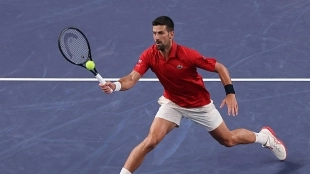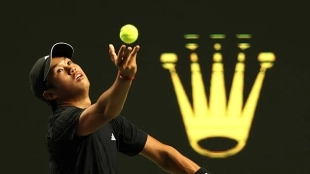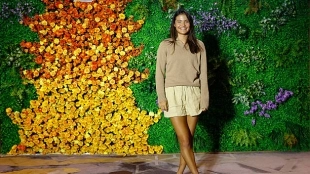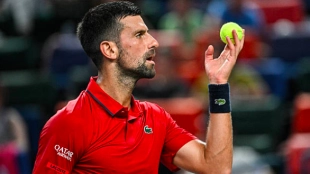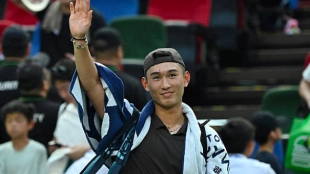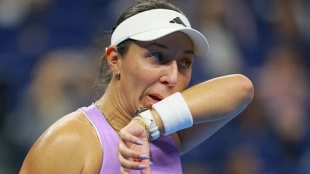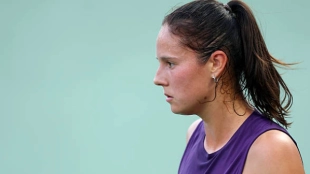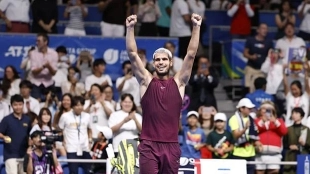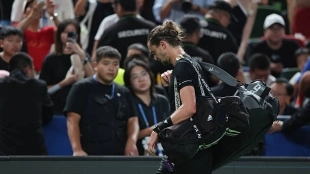
I settle back on the sofa, very calmly, and review the list of names that will be playing in the Kigali Challenger. It's not so different from what I would do in my day-to-day life, immersed in the current affairs of a circuit, the ATP Challenger Tour, which brings you closer than anyone else to the action of the best tennis in the world. The only difference, of course, is that I have just arrived in Rwanda, a land rebuilt on the ashes of the most savage genocide and which has now become the cradle of the most important tennis tournament in central, eastern and southern Africa. I reckon there are plenty of interesting names to chat with, but the first reactions from the audience are all heading en masse towards a guy who lived through the golden age of the sport's history at close quarters: Bernard Tomic.
The task, believe me, is not an easy one. Bernard arrives in Rwanda after accumulating tournaments in India, on completely different surfaces (he goes from hard courts to clay, with the added element of the altitude of the Rwandan capital, that accounts for more than 1500 metres). He has always been a man of contrasts, contrasts that are exacerbated on his arrival in Kigali: the torrid African sun hardly gives him time to adapt, his appearances at the club are of lesser volume than those of other players and, as if that was not enough, an illness (it looks like an stomach illness) strikes him just before his debut. He leaves everything on the court, but falls short to the Romanian Ionel.
The challenge is getting bigger, but I quietly approach him... and I meet a polite, friendly guy, far from the many labels that have been attached to him over the years. Bernard makes time for me before he leaves the club - at 32, his love for tennis has returned without the need to find it on the big stages. At what stage of his career does he find himself in? What are his memories of those battles against the Big Three? How has tennis changed in recent seasons? This is just one of the many conversations and memories you will read about from an unforgettable journey... but perhaps the one people wanted to read the most. Enjoy.
CN: Here we are with Bernard Tomic. First of all, Ben, I appreciate you being here with us. Of course, you travelled to Rwanda from India. It’s a long travel, different conditions. How did you feel about your first match? And, especially, how do you feel about this event? What are your thoughts on its organization?
BT: I think it's pretty, pretty good. There are two tournaments here. Um, so I only played one, which is the last one. Yeah, and I came from India, so it was a little bit tough to adapt from hard court to clay, and a little bit more altitude. So, today was a little bit... not so pleasant for me. I was feeling sick mostly through the match. You know, always in altitude, in high altitude, you need a couple of days. You need about four or five days. So, today was tough for me.
This year, you came back to Grand Slams by your own ranking, by your own merits. In which stage of your career would you say you are? Are you playing for the love of the game or do you have any main goals in mind?
I don't know. I mean, like, not really. I mean, I'm just playing to play, you know? (laughs) It keeps me, gives me a purpose, you know? It gives me something to do. Um, you know, I missed a lot of tennis the last three, four years. So, I started again. It's okay. I went back to 200 or 210 playing in the Grand Slams, the Australian Open this year. So, yeah. Let's see. I’m going to try to play the French Open and Wimbledon qualifying. So, I have no really goals, um, just to play tennis, see how it goes.
I don't know if this is a tough question, but I feel it's a very interesting one. Do you enjoy tennis more now or when you were a bit more under the spotlight?
Obviously, you know, having a purpose, every day you wake up, it gives you something to do. Everyone needs to have a purpose. I feel like, you know, I played obviously pretty well in my career, the first five, seven years and I didn't play a lot of tennis after. Now, I prefer not having the attention as much. You know, a little bit of spotlight is not good. Um, people are always like wanting to be someone and wanting to be famous and whatever. When you understand this and get older, you understand it's the little things that matter, you know?
So, I mean, I'm enjoying being in the moment now, playing tennis. You know, obviously I was in my prime when I was top 15, top 20, but now it’s a little bit tougher because everyone is good. Everyone up to 500, 600 can be top 100, you know? The level is so tough. So, there's a little chance for sure to play well to get inside top 100. But… I mean, I'm gonna try it, see how it goes the next year or two, and then, then we're gonna see, you know?
Following up with what you said, because I feel it's very interesting. Compared to when you were coming up, do you feel that tennis is much tougher nowadays? Perhaps players hit the ball harder now?
Oh, everything's getting better. I mean, top 10, top 20 when I played was the toughest - Federer, Rafa, Novak, Murray. There were also guys like Berdych or del Potro. This was the toughest top 10, top 15. It was ridiculous. I mean, nobody could play a quarters or semis of a Slam. Like, if someone comes to a semi, we would be like, "Wow, who's this?" It would always be those four guys, five guys. It’s changed a lot, but back 10 years ago, guys ranked 600 or 700 would not be beating guys top 100. Now, every week in Challengers guys are losing to guys 600, 700. Everybody's good now. Generations are changing. Everyone is getting better. The depth is unreal, you have so many good players at 300, 400. So, yeah, let's see how I go the next, let's say, one, two years.
You mentioned the pressure, the media noise, people talking a bit too much. I remember I was speaking to Omar Jasika a couple of years ago about the Australian media, about how they can become so tough on you guys, specially when you’re young and coming up. Do you wish they would’ve done something different back in 2011 or 2012, when you were breaking through?
The media is always the media. In any country, you know, they can be a little bit funny towards players or whoever you are. It's never gonna change, the media. A lot of people would rather wake up and read bad media about someone than good stuff. Bad media draws attention from people, it sells, it makes them money, it's a business for them. I have nothing against the media. I would not change anything for them. They're doing their business, you know, I'm doing mine. For sure, maybe I did some things in the start of my career that were not so pleasant (laughs), but it's okay. I was young.
No one 's perfect.
Yeah. Of course.
You discussed the great generation you played against, and not only maybe the big three, I remember you beating Soderling at Wimbledon, for example, lots of phenomenal players. What was it like playing against the Big Four and all of these guys and how would you compare their games?
I played a lot of times fourth round of the Grand Slams. I lost in Grand Slams’ fourth round maybe six or seven times. I was losing fourth round to Federer, fourth round to Murray in Australian Open. I had many fourth rounds, I could only get to one quarterfinal, I was always losing to these top guys. It was so difficult… you'd have to beat Federer in the third round, Rafa in the fourth round, quarters you'd have to beat Novak. It was absolutely impossible back then, at their prime, in a Grand Slam. Tennis was so difficult in that era. At that time, I was losing so many times in the fourth round - at the moment it is a bit more open. I see some guys making quarters, semis of Grand Slam… this would not happen 10 years ago, you know? The guys were too good.
I understand.
But I have to say, as I mentioned, the other guys improved so much as well. The guys behind: top-100, top-200, top-300…
The middle class of the tour.
Yeah, they got better.
Being a Spanish, I have to ask you about Rafa. Your relationship with him was very good…
Rafael, the king (smiles).

Yes, the king. What are your memories of spending time together, both on and off the court?
He was really good. He was a great guy, great champion. I thought we learnt a lot from him. Nobody ever will do what he did, winning this many Grand Slams on clay. Nobody's ever gonna do this. It's impossible. He's gonna leave a legacy that no one can catch up to on clay. I learned a lot. As a person, he was a good person off the court. It doesn't matter so much a player, you know, as much as he was a good person. So, I really respect him for this, and that’s why he did so many great things.
When I came here, Bernard, everyone was telling me, "You gotta interview him."
Okay. (laughs)
"You gotta interview Tomic." Why is that?
I don't know. (laughs)
Why do you think you draw so much public attention to you? People enjoy watching you play…
I don't know. I mean, I had a little bit of a different story, different way of playing tennis, different everything. So, I don't know. Let's see. I'm playing tennis now. I'm back kind of, so let's see how I'm gonna go in this.
The grind is there.
The grind is there. Let's see how I'm gonna go. But apart from the question you were saying, I mean, I don't know, man. You have to talk to these people first. (Laughs)
* Pictures inside the article: Julius Ntare / Rwanda Challenger
This news is an automatic translation. You can read the original news, Tomic: "Aprendí mucho de Nadal, su legado es inigualable"



